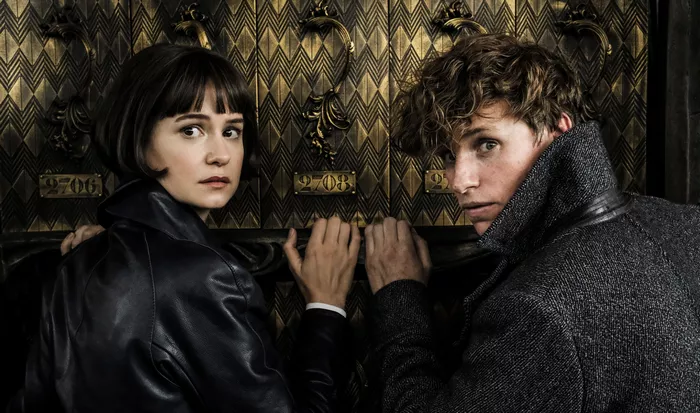The enchanting world of Harry Potter, a cultural phenomenon that has captured the hearts of millions, faces a challenging crossroads as the possibility of extending its magic onto the silver screen is marred by complexity. The shortcomings of the Fantastic Beasts movies, intended as an expansion of J.K. Rowling’s Wizarding World, have cast a shadow over the feasibility of further cinematic exploration. The struggle to seamlessly integrate new storylines and characters into the existing wizarding narrative became evident as the series unfolded. The attempt to recapture the essence of the original Harry Potter series while introducing fresh elements proved to be a delicate balancing act, and the movies fell short of the soaring expectations set by their predecessor. This revelation underscores the intricate challenge of expanding a beloved universe without compromising its core magic.
I. Fantastic Beasts’ Faltering Footsteps: A Lesson in Cinematic Struggles
The journey of the Fantastic Beasts series has been a rollercoaster of narrative inconsistencies, controversies, and an inability to recapture the magic that made the original Harry Potter series a global phenomenon. The narrative inconsistencies, ranging from character arcs to the fundamental understanding of the wizarding world, left fans and critics alike scratching their heads. Moreover, controversies surrounding key characters and themes, especially related to author J.K. Rowling’s statements, further added to the franchise’s woes. The attempt to introduce new characters and storylines while maintaining the coherence and charm of the Wizarding World proved to be an ambitious task, one that the Fantastic Beasts movies struggled to achieve. This struggle served as a cautionary tale about the pitfalls of expanding an established universe without meticulous planning and execution.
II. Wizarding World Woes: Controversies and Audience Alienation
Beyond the narrative struggles, the Wizarding World franchise found itself entangled in controversies that significantly impacted audience perception. The franchise’s handling of diverse representation became a focal point, with criticism directed at its failure to reflect the inclusive values expected in contemporary storytelling. J.K. Rowling’s statements on social issues further alienated a portion of the audience, leading to a fracture within the fanbase. The challenge faced by the cinematic future of Harry Potter is not only about crafting compelling stories but also about navigating the socio-political landscape to ensure that the magic on screen resonates positively with diverse viewers. The fractures in the foundation of the Wizarding World raised questions about the feasibility of future cinematic endeavors within this universe and the need for a thoughtful, inclusive approach.
III. Hogwarts Legacy’s Paradox: A Tale of Success Amidst Struggles
In the midst of the struggles faced by the Fantastic Beasts movies, the unexpected success of the Harry Potter: Hogwarts Legacy video game introduced a paradox into the cinematic debate. The game’s triumph indicated that the allure of the Wizarding World remains potent, and the universe still holds a special place in the hearts of fans. However, this success also prompts a reevaluation of the source of the cinematic struggle—was it the broader Wizarding World or specifically the execution of the Fantastic Beasts narrative? The game’s success opens up the possibility of exploring alternative avenues for expanding the Harry Potter universe beyond the confines of traditional cinema. It suggests that perhaps a shift in medium or storytelling approach could offer a fresh perspective and reignite the enchantment that captivated audiences worldwide.
IV. The Risk of Recreating Magic: Remaking the Original Harry Potter Movies
One intriguing proposition that has surfaced in discussions about the cinematic future of Harry Potter is the idea of remaking the original movies in an extended format. The temptation lies in the potential to delve deeper into the rich source material, providing a more comprehensive portrayal of the beloved stories. However, this proposition is not without risks. The original Harry Potter movies hold an indelible place in the hearts of fans, with iconic moments and characters etched into the cultural zeitgeist. The risk of tampering with these cherished memories, attempting to recreate the magic in a longer format, could potentially dilute the nostalgia and charm that make the original movies timeless classics. The challenge lies in striking a delicate balance between honoring the source material and introducing fresh elements without compromising the integrity of the beloved franchise.
V. Nostalgia vs. Uncomfortable Realities: The Challenge of Extended Formats
The prospect of remaking the original Harry Potter movies prompts a critical examination of the balance between nostalgia and the uncomfortable realities of our current cultural landscape. The original movies, released between 2001 and 2011, hold a special place in the hearts of fans who grew up with the characters and narratives. The challenge in extending these stories lies in the potential dissonance between the nostalgic expectations of the audience and the need for narratives that resonate with contemporary sensibilities. In a world that has become more socially aware and diverse, the risk of unintentionally perpetuating outdated perspectives or compromising the magic of the original tales becomes a central concern. Extending the cinematic magic of Harry Potter in a different format may risk altering the audience’s perception and emotional connection to the narrative, potentially leaving them more uncomfortable than entertained.
Conclusion: Navigating the Magical Minefield
As the debate surrounding the cinematic future of Harry Potter continues, it is clear that navigating the magical minefield requires a delicate touch. Learning from the missteps of the Fantastic Beasts series and acknowledging the evolving socio-political landscape is essential. The challenge is not just about crafting compelling stories or choosing the right format; it’s about understanding what makes this fantastical world so enchanting to fans around the globe. Whether the answer lies in exploring alternative formats, focusing on untold corners of the Wizarding World, or simply allowing the original movies to retain their untarnished charm, one thing is certain – extending the cinematic magic of Harry Potter demands careful consideration and a deep understanding of the delicate balance between preserving the past and embracing the present and future of this beloved universe.

